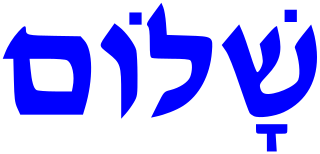
Shalom is a Hebrew word meaning peace and can be used idiomatically to mean hello.
Yevanic, also known as Judaeo-Greek, Romaniyot, Romaniote, and Yevanitika, is a Greek dialect formerly used by the Romaniotes and by the Constantinopolitan Karaites. The Romaniotes are a group of Greek Jews whose presence in the Levant is documented since the Byzantine period. Its linguistic lineage stems from the Jewish Koine spoken primarily by Hellenistic Jews throughout the region, and includes Hebrew and Aramaic elements. It was mutually intelligible with the Greek dialects of the Christian population. The Romaniotes used the Hebrew alphabet to write Greek and Yevanic texts. Judaeo-Greek has had in its history different spoken variants depending on different eras, geographical and sociocultural backgrounds. The oldest Modern Greek text was found in the Cairo Geniza and is actually a Jewish translation of the Book of Ecclesiastes (Kohelet).
Judaeo-Portuguese, Jewish-Portuguese or Judaeo-Lusitanic, is an extinct Jewish language or a dialect of Galician-Portuguese written in the Hebrew alphabet that was used by the Jews of Portugal.
Judaeo-Romance languages are Jewish languages derived from Romance languages, spoken by various Jewish communities originating in regions where Romance languages predominate, and altered to such an extent to gain recognition as languages in their own right. The status of many Judaeo-Romance languages is controversial as, despite manuscripts preserving transcriptions of Romance languages using the Hebrew alphabet, there is often little-to-no evidence that these "dialects" were actually spoken by Jews living in the various European nations.
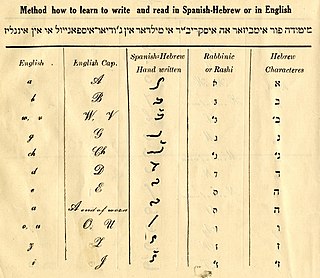
Solitreo is a cursive form of the Hebrew alphabet. Traditionally a Sephardi script, it is the predecessor of modern cursive Hebrew currently used for handwriting in modern Israel and for Yiddish. The two forms differ from each other primarily in that Solitreo uses far more typographic ligatures than the Modern Hebrew script.

The history of the Jews in Turkey covers the 2400 years that Jews have lived in what is now Turkey.
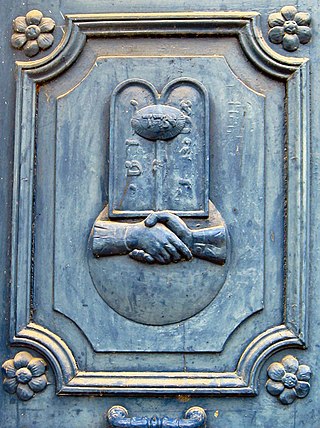
The Alliance israélite universelle is a Paris-based international Jewish organization founded in 1860 with the purpose of safeguarding human rights for Jews around the world. It promotes the ideals of Jewish self-defense and self-sufficiency through education and professional development. The organization is noted for establishing French-language schools for Jewish children throughout the Mediterranean, Iran, and the former Ottoman Empire in the 19th and early 20th centuries.

Haketia is an endangered Jewish Romance language also known as Djudeo Spañol, Ladino Occidental, or Western Judaeo-Spanish. It was historically spoken by the North African Sephardim in the Moroccan cities of Tétouan, Tangier, Asilah, Larache, Chefchaouen, Ksar el-Kebir, and the Spanish towns of Ceuta and Melilla. Tetuani Ladino was also spoken in Oran, Algeria. One of the distinctions between Ladino and Haketia (Haquetia) is that the latter incorporates Moroccan Arabic.
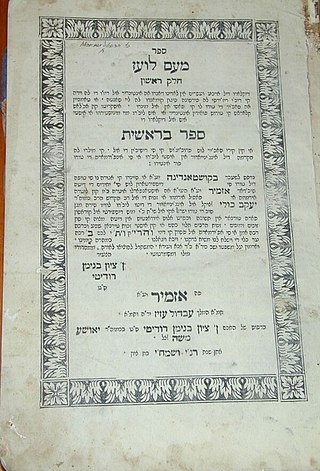
Me'am Lo'ez, initiated by Rabbi Yaakov Culi in 1730, is a widely studied commentary on the Tanakh written in Judaeo-Spanish. It is perhaps the best known publication in that language.

The languages of Turkey, apart from the official language Turkish, include the widespread Kurdish (Kurmanji), Zazaki, and Arabic, and a number of less common minority languages. Four minority languages are officially recognized in the Republic of Turkey by the 1923 Treaty of Lausanne and the Turkey-Bulgaria Friendship Treaty of 18 October 1925: Armenian, Bulgarian, Greek, and Hebrew. In 2013, the Ankara 13th Circuit Administrative Court ruled that the minority provisions of the Lausanne Treaty should also apply to Assyrians in Turkey and the Syriac language.

Judaeo-Spanish or Judeo-Spanish, also known as Ladino, is a Romance language derived from Old Spanish.
Aki Yerushalayim is an Israeli magazine in Judaeo-Spanish (Ladino) published in print two to three times a year between 1979 and 2016, and exclusively online since 2019.
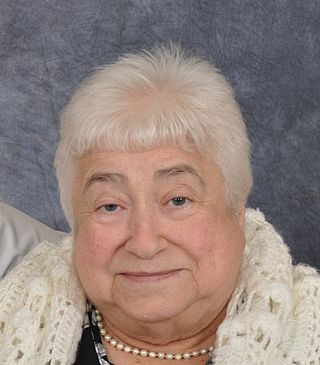
Matilda Koen-Sarano was an Italian-born Israeli writer. Born to Turkish Jewish parents, she was one of the most widely known writers in the Ladino language.
Eastern Sephardim are a distinctive sub-group of Sephardic Jews mostly descended from Jewish families which were exiled from Iberia in the 15th century, following the Alhambra Decree of 1492 in Spain and a similar decree in Portugal five years later. This branch of descendants of Iberian Jews settled across the Eastern Mediterranean.
Beki Luiza Bahar was a Turkish-Jewish writer and playwright.
El Amaneser is a Ladino or Judaeo-Spanish monthly newspaper published in Istanbul.
Rabbi Menachem Mendel Chitrik, better known as Rabbi Mendy Chitrik, is an American, Israeli, and Turkish Rabbi of the Ashkenazi Jewish community of Turkey since 2003. He became the chairman of the Alliance of Rabbis in Islamic States in 2019.

La Epoca was a Ladino language newspaper published between 1875 and 1911 in Thessaloniki, Ottoman Empire. Published nearly for forty years it was the leading Ladino publication in the Empire and first Ladino newspaper in Thessaloniki.
Karen Gerşon Şarhon is a scholar of Judaeo-Spanish and the coordinator of the Ottoman-Turkish Sephardic Research Center.









